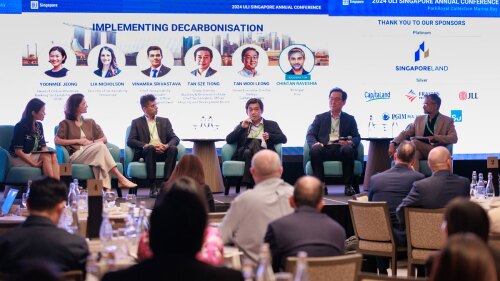Real estate investment in the Asia Pacific region has been on a downward trend since 2019, and market uncertainty brought about by the COVID-19 pandemic has exacerbated the situation, said speakers at a recent ULI Singaporeevent held virtually.
For most of 2019, investment activities decreased in the region, mainly due to the United States/China trade conflict and civil unrest in Hong Kong. Against this backdrop, a joint ULI/PwC forecast report, Emerging Trends in Real Estate: Asia Pacific 2020, highlighted Singapore as the best prospect in the region for investment—ahead of Tokyo, Sydney, and Melbourne—largely due to foreign capital inflows.
However, the pandemic has ensured continuing contraction in APAC for the first quarter of 2020, with investors largely adopting a wait-and-see approach, panelists shared during the capital markets discussion held at the 2020 ULI Singapore Conference.
ULI members can access recordings of this discussion on Knowledge Finder.
Moderator Chua Yang Liang, head of group research and strategy at ARA Asset Management, noted that Real Capital Analytics data showed that APAC real estate volume, in terms of dollar value, had contracted 50 percent in the first quarter of this year.
According to Terence Tang, managing director of capital markets in Asia for Colliers International, the impact of the pandemic meant a significantly quieter first quarter than in years past.
“We started to see investment decisions being held back,” said Tang. “Most of the investors I deal with are now very unsure how this crisis will play out. It’s unprecedented. All the signs are pointing to a global recession this year, but how bad would it be?”
He noted that the most badly affected sectors were hospitality and prime retail, followed by student housing, and that job-saving government stimulus packages will not promote growth.
On the other hand, technology-related real estate was the least affected, with key logistics and data center deals in China, South Korea, and Japan among transactions in recent months.
Rushabh Desai, CEO, Asia Pacific, for Allianz Real Estate, said the logistics and residential for-rent sectors look relatively less affected and that the impact on student housing should be short term depending on when travel restrictions are lifted.
Keppel Capital CEO Christina Tan said that the pandemic will have further accelerated investment in data centers, logistics, and health care since demand for cloud services has soared.
“The digital transformation we had expected to take years has now been further accelerated and compressed within a matter of weeks and days.
“And health care may be magnified even further, because there’s this need for good social infrastructure. I think, going forward, that governments all over the world will be even more pressured to build good hospitals, and testing, quarantine, and community care centers.”
Desai said that continuing low interest rates meant that capitalization rates are likely to remain steady with room for some expansion, across 10 to 25 basis points in his estimation.
Given the low-interest-rate environment, Tang added that it was understandable for there to be a lot of institutional “powder” being kept dry with hundreds of billions waiting to be deployed.
“Interestingly, from my conversations with investors, they are looking at the different markets, resetting risk premiums and yields, and trying to find an equilibrium level,” he said.
From an asset manager perspective, Tang added that ongoing social distancing and enhanced cleanliness protocols would raise the cost of running assets, while efficient use of assets, with anti-crowding measures needed, would go down.
Desai said that the phased lifting of lockdowns in different countries will affect how quickly investment activity can resume, noting that some activity is already picking up in China.
“I think in Asia Pacific, it’s not impossible to do a transaction; we’ve been successful in closing a few transactions,” he said, despite travel restrictions hindering due diligence.
“I think advisers, brokers, and consultants are still working and able to travel within their countries or cities, and that allows some business as usual.”
Tang observed that cross-border investors formed about one-third of all investors in the first quarter of the year and said he expected that most buyers in the second and third quarters would likely be domestic investors, with cross-border investors only resuming their activity in the fourth quarter of this year.
While the time horizon for a resumption of regular investment activity throughout the region remains uncertain, with recovery projections ranging from six to 24 months, there is still optimism regarding the long-term growth for growth in APAC.
“The focus for investors like us is securing the income profile for the next 12 to 24 months,” said Desai. “Then we would still be confident, especially in this region, in terms of the long-term potential of the markets that we operate in.”
He added that pent-up demand, citing the phenomenon in luxury retail known as “revenge spending” as seen in China, could be a factor and that current assumptions may not hold.
“Today, the assumption is that people will travel less and not be spending on retail or going to malls, but you never know. If a vaccine is developed, the behavior might change completely and people could make up for the [things] they haven’t done,” Desai said.
“It’s still unknown whether it’s a U-shaped, L-shaped, or any other shape of recovery.”




